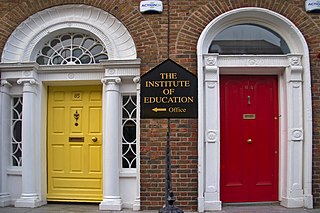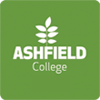Related Research Articles

A student is a person enrolled in a school or other educational institution.
The Leaving Certificate Examination, commonly referred to as the Leaving Cert or (informally) the Leaving, is the final exam of the Irish secondary school system and the university matriculation examination in Ireland. It takes a minimum of two years' preparation, but an optional Transition Year means that for those students it takes place three years after the Junior Cycle examination. These years are referred to collectively as "The Senior Cycle". Most students taking the examination are aged 16–19; in excess of eighty percent of this group undertake the exam. The Examination is overseen by the State Examinations Commission. The Leaving Certificate Examinations are taken annually by approximately 60,000 students.

Tutoring is private academic help, usually provided by an expert teacher; someone with deep knowledge or defined expertise in a particular subject or set of subjects.

Education in England is overseen by the Department for Education. Local government authorities are responsible for implementing policy for public education and state-funded schools at a local level. State-funded schools may be selective grammar schools or non-selective comprehensive schools. All state schools are subject to assessment and inspection by the government department Ofsted. England also has private schools and home education; legally, parents may choose to educate their children by any suitable means.

Education in Singapore is managed by the Ministry of Education (MOE). It controls the development and administration of state schools receiving taxpayers' funding, but also has an advisory and supervisory role in respect of private schools. For both private and state schools, there are variations in the extent of autonomy in their curriculum, scope of taxpayers' aid and funding, tuition burden on the students, and admission policy.
Education in the Republic of Ireland is a primary, secondary and higher education. In recent years, further education has grown immensely, with 51% of working age adults having completed higher education by 2020. Growth in the economy since the 1960s has driven much of the change in the education system. For universities there are student service fees, which students are required to pay on registration, to cover examinations, insurance and registration costs.
A cram school is a specialized school that trains its students to achieve particular goals, most commonly to pass the entrance examinations of high schools or universities. The English name is derived from the slang term cramming, meaning to study a large amount of material in a short period of time. The word "crammer" may be used to refer to the school or to an individual teacher who assists a student in cramming.

A private school is a school not administered or funded by the government, unlike a public school.

The Institute of Education (IOE), is one of the largest private secondary schools in Ireland, teaching 4th, 5th and 6th year pupils. As well as preparing for the Leaving Certificate, fourth year pupils at the Institute have the option to study a selection of subjects from the Cambridge International GCSE programme (IGCSE) as well as CEFR Language exams.

Ardscoil Rís is a voluntary boys' secondary school on Griffith Avenue, Dublin, Ireland. The school caters for approximately 570 students every year.

Newbridge College, the Dominican College Newbridge, is a co-educational private fee-paying voluntary secondary school in Newbridge, County Kildare, Ireland, run by the Roman Catholic Dominican Order. The Dominican Friars founded Newbridge Dominican College in 1852 as a boarding school for boys. Today, still run by the Dominican Fathers, Newbridge College is a mixed day school with a student population of almost 1,000 pupils. It is also the home of a resident Community of Dominican Friars - the Priory and Church being centred between the two wings of the College buildings.

Christian Brothers College, Monkstown Park is a private fee-paying Catholic school and Independent Junior school, founded in 1856 in Monkstown, Dún Laoghaire, County Dublin, Ireland. The college arrived at Monkstown Park in 1950 from Eblana Avenue in Dún Laoghaire via a short stint on Tivoli Road. As of September 2022, it was in its 73rd academic year of existence at Monkstown Park, the 165th overall.

Education in Mauritius is managed by the Ministry of Education & Human Resources, which controls the development and administration of state schools funded by government, but also has an advisory and supervisory role in respect of private schools. The Tertiary education is maintained by the Ministry of Tertiary Education, Science, Research and Technology. The government of Mauritius provides free education to its citizens from pre-primary to tertiary levels. Since July 2005, the government also introduced free transport for all students. Schooling is compulsory up to the age of 16. Mauritian students consistently rank top in the world each year for the Cambridge International O Level, International A and AS level examinations. Among sub-Saharan African countries, Mauritius has one of the highest literacy rates. The adult literacy rate was at 91.9% in 2022. According to the 2022 census, the proportion of people with higher education has increased to 8.8%. Mauritius was ranked 57th in the Global Innovation Index in 2023, 1st in Africa.
Scoil Mhuire, is an Irish co-educational post-primary school in Clane, County Kildare. The school is on the western outskirts of Clane, off the Prosperous Road.

Ashfield College is a private post-primary school founded in 1977 and located in Dundrum in Dublin, Ireland. The school offers preparation for the Leaving Certificate examination, both as a two-year leaving certificate senior cycle, but also as a one-year programme. The school also caters for overseas students wishing to study in Ireland for the Irish leaving certificate. Twenty one leaving certificate subjects are taught at the school, and the school uses e-learning facilities, and students can access course material, including recorded lectures online. As well as the popular subjects for the leaving cert some less common leaving cert subjects of Arabic, Agricultural Science and Classical Studies are also available at Ashfield. The school offers a career guidance service to students with advice on academic and career issues, such as advice on completing the Irish CAO college application process or the UK UCAS system.
Ormonde Education Group was a professional education provider based in Tullamore, County Offaly, Ireland. Under the name Ormonde Business School or Ormonde College, the group ran a number of Business, Administration, Accounting(ACCA), Design and IT. The college also ran English language courses, and training for entrance to medical schools.
The Junior Cycle is the first stage of the education programme for post-primary education within the Republic of Ireland. It is overseen by the Department of Education and the National Council for Curriculum and Assessment (NCCA), and its terminal examination, the Junior Certificate, by the State Examinations Commission.

Cross and Passion College is a voluntary Catholic secondary school for students ages 12-19 around the County Kildare village of Kilcullen in Ireland.

Norma Foley is an Irish Fianna Fáil politician who has served as Minister for Education since June 2020. She has been a Teachta Dála (TD) for Kerry since 2020.

On 12 March 2020, all schools, colleges, and childcare facilities in the Republic of Ireland were shut down in response to the COVID-19 pandemic. The shutdown resulted in the cancellation of the 2020 Leaving Certificate and 2020–2021 Junior Certificate examinations, as well as all 2020–2021 Irish language summer courses in the Gaeltacht.
References
- ↑ "Are grinds a waste of time?". independent.ie. 29 April 2008. Retrieved 19 June 2024.
Almost half of all Irish pupils now use some form of extra tuition before the Leaving Cert [..] Poor teaching, disruptive classrooms, illness, and a competitive hunger for points for third level colleges are all commonly cited as reasons for doing grinds
- 1 2 "Rising numbers of well-off pupils do 'grinds' to boost Leaving Cert grades". independent.ie. 18 April 2022. Retrieved 19 June 2024.
- ↑ "Colman Noctor: Leaving Cert grinds putting students under additional pressure". Irish Examiner. 2 April 2024. Retrieved 19 June 2024.
- ↑ "Teachers play down reports of tax investigation over grind fees". The Journal. 9 January 2012.
- ↑ Grinds Archived 28 March 2012 at the Wayback Machine Ashfield College
- ↑ "Class goes on for the students at Bruce". The Irish Times. 21 November 2000. Retrieved 30 June 2020.
- ↑ Hickey, Shane (28 October 2008). "Sacrifices will be made to pay for the grinds". Irish Independent. Retrieved 30 June 2020.
- ↑ "Former Bruce College Dublin principal to set up grind school". The Irish Times. 28 May 2002. Retrieved 30 June 2020.
- ↑ "Yeats College Grinds". yeatscollege.ie.
- ↑ "Grind schools - a blessing or a curse?". universityobserver.ie. 20 April 2022. Retrieved 19 June 2024.
- ↑ "Grind schools in league tables". irishtimes.com. 27 November 2013. Retrieved 19 June 2024.
- ↑ Donnelly, Katherine (21 May 2020). "Pupils from Irish-speaking and grind schools less likely to finish college" . Retrieved 24 March 2022.
- ↑ "Shadow Education uptake among final year students in secondary schools in Ireland: Wellbeing in a high stakes context" (PDF). esri.ie. April 2022. Retrieved 19 June 2024.